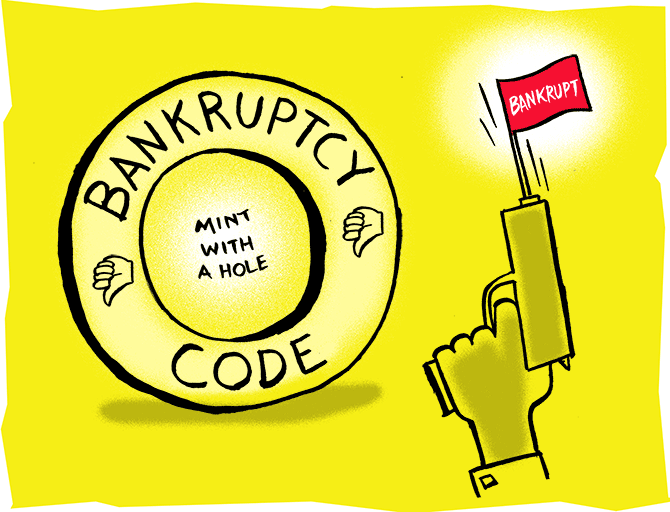 | « Back to article | Print this article |
The PMLA -- an Act enforced by the ED -- has been locking horns with the IBC in courts, trying to establish the other as a general law; a special law prevails over general law.
However, from a business enabling point, the IBC's supremacy over the PMLA must withhold, writes Ishita Ayan Dutt.
Illustration: Dominic Xavier/Rediff.com

In a bid to make way for a better insolvency resolution process, the Union Cabinet has approved a set of amendments to the Insolvency and Bankruptcy Code (IBC) through the Insolvency and Bankruptcy Code (Second Amendment) Bill, 2019.
Primary among the amendments was the insertion of Section 32A, which indemnifies the corporate debtor from past criminal liabilities.
But would it put an end to the battle of primacy between two overlapping laws -- the Prevention of Money Laundering Act (PMLA) and the IBC? Experts are sceptical about how it will play out.
One of the 12 big-ticket NPAs (non-performing assets) recommended by the Reserve Bank of India (RBI) for resolution under the IBC, Bhushan Power & Steel, was approved by the National Company Law Tribunal (NCLT) early September.
A month after, the Enforcement Directorate (ED) attached immovable properties of Rs 4,023 crore of the company in a bank fraud case under the PMLA.
That single event rankled, not only JSW Steel -- the winning bidder -- but also resolution applicants and lenders across the board.
With the amendments, the government made its intent clear.
It was bent on providing applicants and the corporate debtor immunity from criminal liabilities to start on a clean slate.
The amendment in that sense was clear in its scope of preventing attachment or seizure of property of a company under insolvency after a resolution plan is approved.
Bharat Chugh, partner, L&L, said: "It is also worded fairly widely and may include within its ambit not just the attachment by the ED under the PMLA but also other agencies under other special laws, such as the Prevention of Corruption Act, the Fugitive Economic Offenders Act."
"A person bidding for a company should be given the assurance that the new management and remaining assets of the company are safe as it is only with that legitimate expectation that someone will invest in the company and assets would command a price commensurate with their real value," he added.
Kumar Saurabh Singh, partner, Khaitan & Co, said: "This amendment makes it clear that assets cannot be attached after a resolution plan is adopted even if an investigation under the PMLA is underway where there is a clear transfer of assets to an unrelated party."
There is but one small snag.
The spirit and intent of the amendments need to be respected by the ED and other authorities.
The ED is an investigative agency under the finance ministry; the MCA is entrusted with administering the IBC.
The PMLA -- an Act enforced by the ED -- has been locking horns with the IBC in courts, trying to establish the other as a general law; a special law prevails over general law.
The ED's argument in some cases has been that the PMLA is a special law because it deals with tainted property and proceeds of crime and the IBC is a general law as it involves the revival of companies.
"On the other side, the argument is that the IBC is the special law between the two of them -- as it contemplates revival of a company when it is sick.
"Also, the IBC is a later law and the legislature was perfectly mindful of the PMLA while drafting it and having given it an overriding effect," said Chugh.
An amendment to the IBC was necessary but it also begs the question: Is it sufficient?
According to Chugh, in order to avoid doubts, and by way of abundant caution, it may also be a good idea to follow this up with a corresponding amendment in the PMLA, making it clearer.
Or, it would leave room for courts to interpret it in different ways.
The Delhi high court, in the case of deputy director, Directorate of Enforcement Delhi versus Axis Bank, held that both PMLA and IBC have overriding clauses but they don't operate in the same sphere and therefore, can co-exist and it cannot be said that the IBC overrides the PMLA per se.
However, it did say that, in a given case, if the lender had a prior bona fide right on the property and nothing to do with the offence in question, it could be released from attachment.
From a business enabling point, the IBC's supremacy over the PMLA must withhold.
For that to happen, the responsibility lies with the prosecuting agencies to act in time and that, too, appears to be the intent of the government.
The amendment puts a timeline pressure on the prosecuting agencies to file something in court before a resolution plan is adopted, said Vidisha Krishan, partner, M V Kini & Co.
"If after a resolution plan is adopted and the new management takes charge, any agency comes forward and claims that the assets of the corporate debtor are from proceeds of crime then it is not business enabling. The onus, therefore, is on the agencies to establish proceeds of crime before the plan is adopted."
It is also equally difficult to establish proceeds of crime.
Can a timeline be laid down? It often takes time, said Krishan.
Globally, there are many cases of siphoning off money where it has taken years to discover the proceeds of crime.